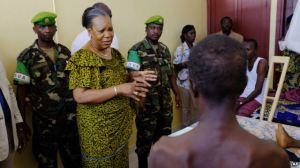2 February 2015 – Both chambers of the US Congress have introduced the Global Magnitsky Human Rights Accountability bill, a deterrent for kleptocrats and human rights abusers around the world. The new bill expands and globalizes the Magnitsky Act of 2012, which created targeted visa and financial sanctions on corrupt officials and human rights violators in Russia.
“This is a poignant legacy for Sergei Magnitsky, a man who gave his life for his ideals, to have his name on a piece of legislation which will fight impunity of human rights abusers and corrupt officials around the world,” said William Browder, leader of the global Magnitsky justice movement.
The Global Magnitsky Bill has been introduced in the House of Representatives by Chris Smith, Chairman of the U.S. Helsinki Commission (http://www.csce.gov/), and Jim McGovern, Co-Chairman of the Tom Lantos Human Rights Commission (http://tlhrc.house.gov/), and in the Senate by U.S. Senators John McCain and Ben Cardin, with co-sponsors U.S. Senators Dick Durbin (D-Ill.), Roger Wicker (R-Miss.), Jeanne Shaheen (D-NH), Marco Rubio (R-Fla.), Ed Markey (D-Mass.), Mark Kirk (R-Ill.) and Richard Blumenthal (D-Conn.) (http://www.cardin.senate.gov/newsroom/press/release/cardin-mccain-reintroduce-global-magnitsky-human-rights-accountability-act).
The House version of the Global Magnitsky Bill (H.R. 624) contains stronger language, in particular, directing rather than permitting the U.S. President to impose sanctions on kleptocrats and gross human rights violators. It also assigns the U.S. Comptroller General to examine and report on the implementation of the legislation. The House version of the Global Magnitsky Bill also requires the sanctions list to be published annually on 10 December, which marks the Human Rights Day in commemoration of the adoption by the United Nations of the Universal Declaration of Human Rights in 1948.
The previous Magnitsky Act of 2012 was a precedent setting piece of legislation requiring the U.S. government to confront impunity, and create consequences for those involved in human rights atrocities in Russia, including the torture and killing of Russian anti-corruption lawyer Sergei Magnitsky, and the $230 million corruption he had uncovered. The targeted sanctions included visa bans and asset freezing, as well as a mechanism through which the sanctioned individuals are publicly named, creating a real consequence for human rights abusers in Russia.
The Global Magnitsky Bill extends these tools to foreign government officials and their senior associates responsible for or complicit in ordering, controlling or directing “acts of significant corruption, …bribery, or transfer of the proceeds of corruption to foreign jurisdictions” and those who “materially assisted, sponsored, or provided financial, material, or technological support” for such activities.
The genesis of the 2012 Magnitsky Act and the extraordinary story of Sergei Magnitsky, whose name now lives in the U.S. law, are featured in the explosive new book by William Browder, “Red Notice,” which will be published on 3 February 2015.
U.S. Senator McCain said ahead of the book launch this week:
“In ‘Red Notice’, Bill Browder tells the harrowing and inspiring story of how his fight for justice in Russia made him an unlikely international human rights leader and Vladimir Putin’s number-one enemy.”
To learn more about ‘Red Notice,’ visit the book website: http://billbrowder.com


